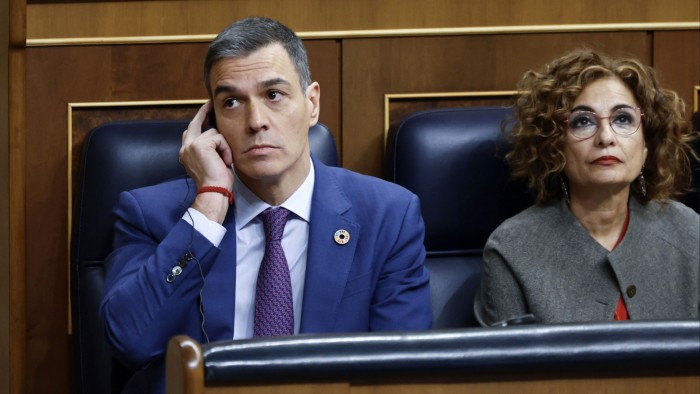Unlock the Editor’s Digest for free
Roula Khalaf, Editor of the FT, selects her favourite stories in this weekly newsletter.
Pedro Sánchez faces an uphill struggle to pass a Spanish budget early next year as he seeks to scotch perceptions of legislative inaction and shore up his position as one of the EU’s few leftwing leaders.
Sánchez, who is more than a year into a new term as prime minister, has set the goal of passing a 2025 budget in the first quarter of the year amid corruption allegations against members of his inner circle, including his wife and brother.
The budget would provide funds that are desperately needed to finance the recovery from devastating floods that hit Valencia in October and to lift Spain’s defence spending, which lags far behind the Nato target of 2 per cent of gross domestic product.
Despite the fragility of the parliamentary support Sánchez needs for a budget, he insisted he would survive until the end of his term. “This legislature will last until 2027 — and then we will have another progressive administration,” he told foreign correspondents on Monday.
Sánchez has been hampered by his inability to control the hot-and-cold political partners his minority government relies on to reach a majority in parliament, notably the hardline Catalan separatist party Junts per Catalunya.
Frustrated by unfulfilled promises to Junts, Miriam Nogueras, the party’s leader in the Spanish parliament, this week told the government to “move your arses”. Junts also called for a motion of confidence against Sánchez, who has been labelled as untrustworthy by its leader, although the group lacks the power to initiate one.
Sánchez’s government gave up trying to pass a 2024 budget earlier this year. The most important law it has introduced since beginning its current term in November 2023 was an amnesty for Catalan separatists — the price the prime minister paid for the Junts votes that enabled him to stay in office following an inconclusive general election.
The Catalan party now wants Sánchez to give the region more influence over immigration and for him to do more to make Catalan an official EU language.
The conservative People’s party (PP), the main opposition, continues to hammer Sánchez over both his fractious political alliances and the graft allegations tainting his inner circle.
“Where you see understanding, your partners see deceit,” Alberto Núñez Feijóo, PP leader, told Sánchez in parliament. “And where you see exemplary behaviour, judges see evidence of wrongdoing.”
Sánchez’s wife Begoña Gómez is facing a judicial investigation into possible influence peddling over her business dealings and ties with universities. His brother David Sánchez has been targeted by a judge investigating how he got a job in a provincial government’s culture department.
Sánchez, premier since 2018, has said he and his family are victims of a rightwing “smear” campaign and this week accused the PP of “colluding with judges”. He has insisted that neither of his family members has done anything wrong.
Pablo Simón, a politics professor at Madrid’s Universidad Carlos III, said the cases of alleged corruption were not clear cut. “What Begoña Gómez did looks imprudent. We don’t know if it’s criminal,” he said.
What was clear, however, was Sánchez’s problem with “parliamentary arithmetic”, Simón said. It comprises not only Junts, which represents a conservative brand of Catalan separatism, but also the contrary demands of the hard-left Sumar party, which is part of Sánchez’s coalition.
“There is a question about what kind of policies this government can pursue,” Simón said. “Any laws that are ideological or relate to budgetary or tax issues are going to be much more difficult to pass than those to do with the regions.”
Pointing to legislative successes in the past year, Sánchez noted that his government had struck a deal with the PP to reform key judicial institutions, passed tax reforms, and changed the constitution to replace the word “handicapped” with “people with disabilities”.
“We are not just existing. We are governing. We are advancing,” he told foreign correspondents.
In response to Nogueras’ demand, Ángel Víctor Torres, one of Sánchez’s ministers, said the government “hadn’t stopped moving its arse since it took the reins”.
The government says it will have passed 25 laws in the first year of its current term, but analysts say few of them were substantive.
Another alleged corruption case involves José Luis Ábalos, Sánchez’s former transport minister, who was expelled from the Socialist party over a purported kickback scheme related to medical supply contracts during the Covid-19 pandemic. Ábalos denies any wrongdoing.
Read the full article here




